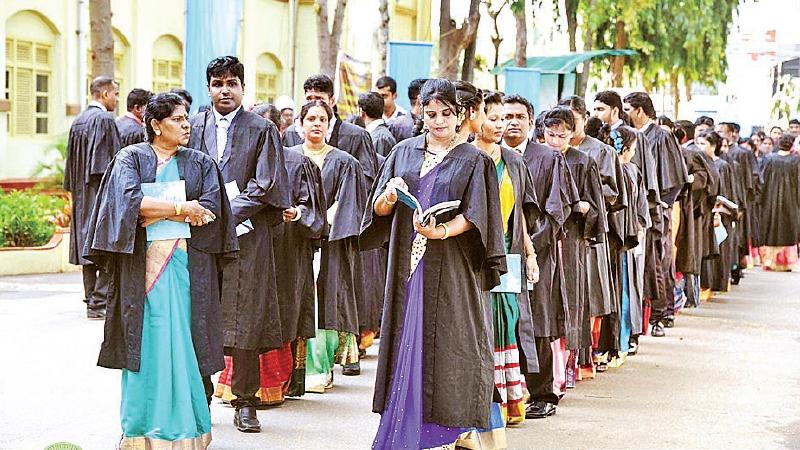
Five years ago, then German Ambassador in Sri Lanka Dr. Juergen Morhard, addressing the German-Sri Lanka Business Council meeting commented, “It’s time for Sri Lanka to realistically weigh in on its higher vocational education qualifications and the types of skill demanded by the market and begin to treat competent craftsmen in informal clothes as valued people of the community”.
He added, “It’s also time to turnaround the picture. The young craftsmen in shorts, T-shirt and flip-flops like the one you see in your TV films need to be respected because they possess the technical and technological skills demanded by today’s industry and the market.”
The German Ambassador’s candid comments pointed to some of the core areas that we have not addressed adequately even today. In essence, he was trying to highlight the importance of competent people, with the right type of vocational skills, demanded by today’s industry and market.
Education experts believe that it’s time we take necessary action to effect a qualitative change in the field of higher vocational education in Sri Lanka. Much of the discussion on higher education is now confined to the field of professional education such as, medicine, engineering, IT technology, etc, which only a small segment of the total number of students actually pursue. In the process, the problems that affect the overwhelming majority of students are marginalised.
At present, we produce too many arts graduates, we have not laid much emphasis on vocational training. We still give prominence to rote learning, and as a result, problem solving, innovative skills and creative thinking are not promoted through our education system.
Weaknesses
The pass rates of Mathematics, Science and English are around 50 per cent. We have not researched the reasons. Even students who pass English Language cannot communicate or write well in English. Our education system is exam-oriented and not research oriented; teamwork is not adequately emphasised. At universities, we produce students who cram lecture notes and reproduce them at exams instead of engaging in reference/research and broadening their knowledge.
It is a bleak situation and time we realized it. It is a generally accepted norm that higher vocational education should be made available to all those who are qualified for university education but could not enter the engineering or technical faculties. This could only be achieved by broadening the opportunities to allow the students to enter higher vocational education institutes.
The Vocational Training Authority of Sri Lanka is the premier institute which conducts vocational training programs in the Government sector. It comprises a network of 220 centres, consisting of seven National Vocational Institutes, 22 District Vocational Training Centres, and 191 Vocational Training Centres established at Divisional Secretariat level, the course duration from 45 days to two years, being conducted under 18 fields. Nearly 30,000 youth are enrolled for these courses, per annum.
The Authority has been functioning for a couple of decades and provided vocational training to youth throughout the island. It should be appreciated, but what we need today is a higher vocational education in keeping with improving world standards.
Vocational studies
We have only one university for vocational studies: The University of Vocational Technology (UNIVOTEC). And strangely, it functions under the purview of the Ministry of Youth Affairs and Skills Development and not under the Ministry of Higher Education. So much for the acceptance and dignity of higher vocational studies.
That is why we need a complete change and not just reforms. We need to improve the relevance of study courses offered in our higher vocational education institutes to conform to the needs of the country. We also have to provide opportunities for teachers to use modern techniques of teaching instead of traditional approaches.
Compared with global standards, we cannot be happy with the quality of our present vocational education. The Government needs to focus more on the quality and introduce necessary regulations for a new initiative. Enhancing the student intake of these institutions does nothing for the development of the quality of education. What we really need to aim at should be a world class quality higher vocational education system.
World-class target
What is meant by a world-class higher vocational education system is one that is student-centred and comprising certified institutions that have the physical and human resources required to ensure that internationally accepted knowledge, skills and dispositions are achieved by the students.
We have to sit back and review whether our current system is aligned with that mission or is exactly the opposite. There are many steps that need to be taken to change this situation.
We need at least two more higher vocational education universities. As a result, a fair number of such institutions are operated by the private sector. These institutions are not well regulated and are of variable quality. Public sector financing should be used to support existing public institutions and to establish new ones.
The enrolment in the public vocational education sector needs to be increased for Sri Lanka to become a developed or developing country.
It should represent the entire population, including females, the weaker sectors, and rural population.
Regardless of whether public or private, a Government appointed Accrediting Agency should collect the proper data and monitor the performance of each institute and ensure accountability for maintaining the specified quality standard.
The higher vocational education system must meet the needs of current and future employers including state sector. At present, there is a mismatch. The higher educational system must equip itself to be the provider of first resort and give the country the skilled workforce it requires.
There are many other steps that need to be taken. If we are to make Sri Lanka’s higher vocational education system world class, there must be one mindset and one policy.
